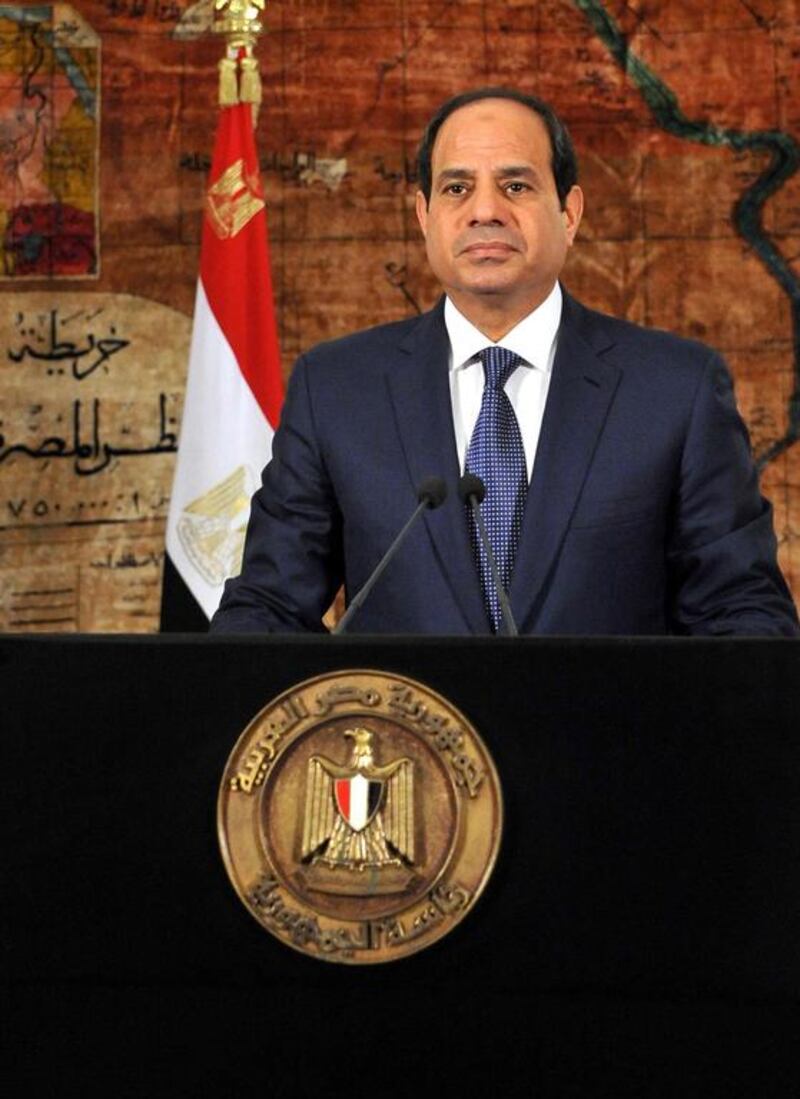CAIRO // A year after ousting Egypt’s Islamist leader, Abdel Fattah El Sisi is sitting in his place at Cairo’s Ittihadya Palace barely a month into his four-year term as president.
Mr El Sisi has said becoming president was not what he had in mind when he removed Mohammed Morsi on July 3 last year, but rather he wanted to prevent Egypt from descending into civil war. He sought the job, he said, because Egyptians wanted him to lead the nation and it was his duty to answer the people’s call.
Now that he has the most important job in the country, Mr El Sisi has serious challenges to deal with and a population with extremely high expectations.
“It is not a secret how tough the economic and security challenges the nation is facing are,” he said in a televised address to mark the anniversary of the mass protests on June 30 last year to demand that Mohammed Morsi step down.
“I have accepted the mission and will not, by God’s will, accept anything but success,” he said. “Let us all realise that the responsibility is heavy, the challenges are grave, but you must also realise that success is not impossible.”
A career infantry officer, Mr El Sisi has consistently shown Egyptians “tough love” since back in the days when he was campaigning for office. “Don’t expect me to do everything myself ... I don’t have a magic wand,” he said in a series of TV interviews. “You must wake up early, walk to work if you can and work hard.”
A week ago, he set an example for Egyptians with deep pockets, saying that he was donating half his salary as president to the treasury along with half the assets he had inherited from his father, who owned a furniture business in Cairo’s old quarter.
Mr El Sisi’s focus on the economy is understandable, given the enormity of Egypt’s financial woes, but it will take more than the kindness of wealthy Egyptians to put it right.
Removing fuel subsidies – which cost the treasury US$20 billion (Dh73.5bn) a year – tops the list of painful and potentially destabilising measures Mr El Sisi must quickly take to free much-needed funds for the cash-strapped education and health sectors .
But it is a risky gamble. Past attempts to reduce subsidies have triggered unrest, something that Mr El Sisi would like to avoid given the already shaky security situation in the country.
However, the government of prime minister Ibrahim Mahlab is determined to go ahead with lifting the subsidies, a move that was expected to come into force this week, but was put off until after Ramadan.
Mr El Sisi has given a two-year timeline for signs of economic recovery, but has said these will only emerge if everyone does their part.
A genuine recovery will also require a dramatic improvement in the country’s security situation.
Islamist militants have for years been waging a war of attrition against security forces in the Sinai Peninsula, but they stepped up their attacks after Mr Morsi’s removal a year ago and extended their area of operations into much of mainland Egypt. Lately, the frequency of attacks in Sinai, as well as high-profile attacks such as car bombings and execution-style killings of policemen and troops, has been significantly lower.
In their place, Egypt is now witnessing targeted killings of senior police officers and attacks on vital installations or services that make up for lower casualties with the greater the panic they spread.
Last week, four near-simultaneous explosions at subway stations in Cairo injured three people and caused widespread panic among morning commuters. They were the first attacks in Egypt since Mr El Sisi’s was elected.
On Monday, three homemade bombs went off only metres from the presidential palace in Cairo’s Heliopolis suburb, killing two police officers and injuring 10 other people.
The bombings were significant in that they happened in the heart of a heavily policed area that is also monitored round the clock by security cameras. They also showed the inefficiency of the police in one of the nation’s most security sensitive areas. The two police officers who died were trying to defuse the bombs without protective gear. The militant group that claimed responsibility for the attacks on Tuesday issued a statement days before the bombs went off saying they had planted them outside the palace, but the police apparently did not feel the need to find and defuse them.
Mr El Sisi vowed to swiftly bring to justice those responsible for the bombings. A day later, he met senior police and security agency officials and, according to people briefed on the meeting, he was furious.
“This will not do,” the officials quoted him as saying. “I will not allow anyone to threaten this country.”
foreign.desk@thenational.ae





